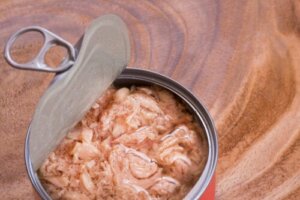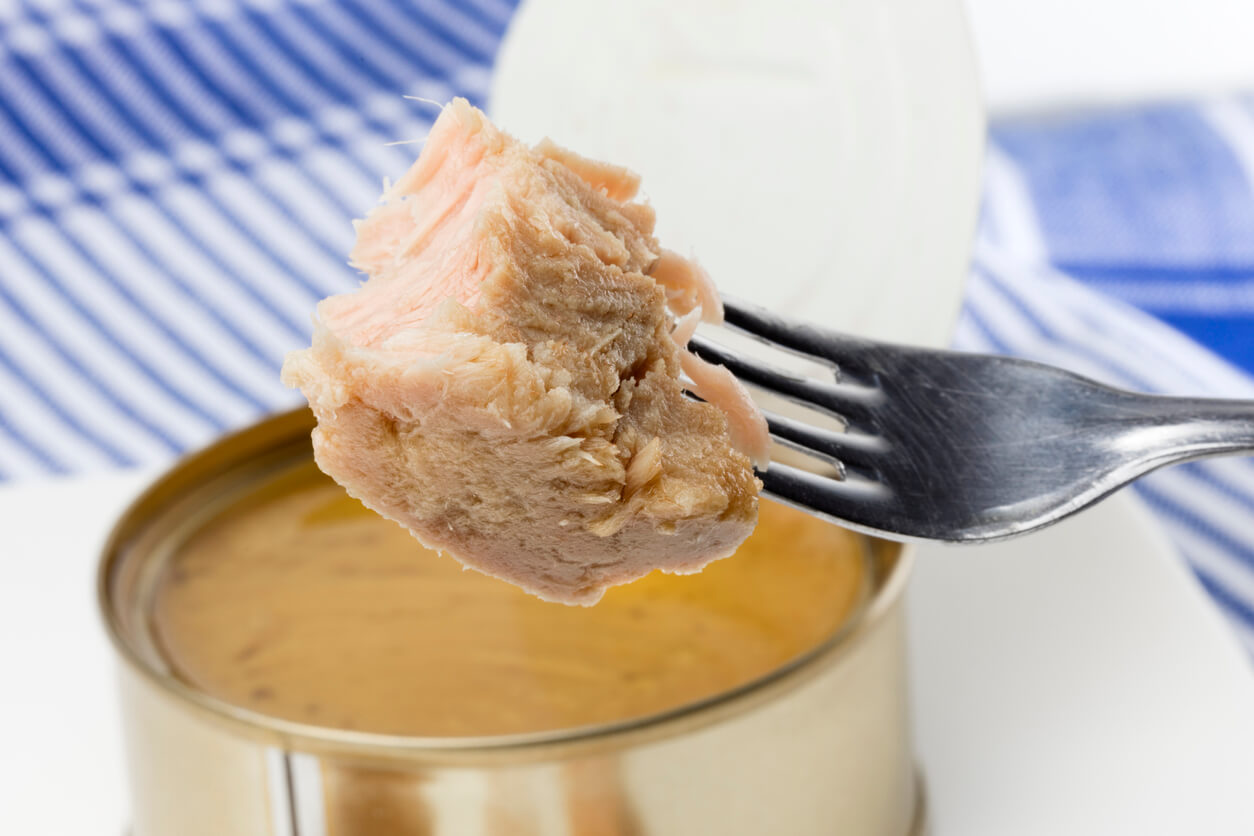Can I Eat Canned Tuna During Pregnancy?


Written and verified by the nutritionist Saúl Sánchez Arias
During the gestation period, it’s crucial to pay more attention to nutrition. Keep in mind that an error at this point could affect the baby’s health and future development. In this regard, you should know that there are some foods that are restricted, as they contain certain toxins. That’s why we’re going to tell you if it’s possible to eat canned tuna during pregnancy.
Before we begin, we must emphasize that fish are beneficial to health in general. Bluefish are especially prized for their content of unsaturated fatty acids, which are high-quality nutrients. In addition, they contain vitamin D, an element that’s deficient in a large part of the population. However, the larger varieties may contain heavy metals.
Is it possible to consume canned tuna during pregnancy?
Canned tuna is a food recommended for almost all types of diets. However, it’s not recommended for pregnant women due to the presence of mercury inside the animal. This mineral accumulates in the fatty tissue, passes to the fetus, and can cause problems in its development. This is evidenced by research published in The International Journal of Occupational and Environmental Medicine.
In fact, tuna has higher mercury concentrations than other large bluefish, such as salmon.
It should also be noted that it’s better to avoid other species of fish during pregnancy, such as emperor, pike, shark, and bluefin tuna. It’s also crucial to be careful with some white fish, such as hake and monkfish, although in this case, the problem has to do with the possible presence of anisakis.

There’s a way to introduce tuna into your diet during pregnancy
Although we’ve told you that it’s best to avoid canned tuna during pregnancy, there’s a way to consume this fish safely. What you have to do is to resort to a particular species known as albacore tuna or light tuna. This has a much smaller size than bluefin tuna, so the concentration of mercury inside it will be much lower.
It’s a safe fish and very beneficial to health, as it has fatty acids of the omega-3 series. These compounds have been shown to help the development of the child’s nervous system and even, during adulthood, are related to a lower cardiovascular risk. In addition, they prevent the appearance of complex diseases that have inflammation as an underlying mechanism.
How to consume tuna safely?
As you’ve seen, it’s possible to introduce light or white tuna into the diet of pregnant women. In this case, it’s best to always prioritize those that come in glass jars over canned ones. Of course, it’s important to read the labeling to verify that they don’t have salt and excess additives.
Tuna pâté
Another option is to buy tuna pâté. It’s not the best food, but its safety profile is high, as it goes through a pasteurization process. This foodstuff provides proteins of high biological value and can be beneficial if it doesn’t contain preservatives or colorants.

Tuna pie
The last of the alternatives is tuna pie, as it’s usually made with canned tuna. In addition, it combines this fish with other foods with high nutritional density, such as eggs and vegetables.
It is possible to consume canned tuna during pregnancy, although not all varieties
As mentioned above, some varieties of canned tuna can be consumed during pregnancy. However, it’s important to avoid bluefin tuna and the other types of fish mentioned, as they could endanger the health of the fetus.
Keep in mind that ensuring a regular intake of omega-3 fatty acids will be essential to ensuring the proper nervous development of the child. With this strategy, the risk of the baby suffering from autism spectrum disorder at birth is reduced.
During the gestation period, it’s crucial to pay more attention to nutrition. Keep in mind that an error at this point could affect the baby’s health and future development. In this regard, you should know that there are some foods that are restricted, as they contain certain toxins. That’s why we’re going to tell you if it’s possible to eat canned tuna during pregnancy.
Before we begin, we must emphasize that fish are beneficial to health in general. Bluefish are especially prized for their content of unsaturated fatty acids, which are high-quality nutrients. In addition, they contain vitamin D, an element that’s deficient in a large part of the population. However, the larger varieties may contain heavy metals.
Is it possible to consume canned tuna during pregnancy?
Canned tuna is a food recommended for almost all types of diets. However, it’s not recommended for pregnant women due to the presence of mercury inside the animal. This mineral accumulates in the fatty tissue, passes to the fetus, and can cause problems in its development. This is evidenced by research published in The International Journal of Occupational and Environmental Medicine.
In fact, tuna has higher mercury concentrations than other large bluefish, such as salmon.
It should also be noted that it’s better to avoid other species of fish during pregnancy, such as emperor, pike, shark, and bluefin tuna. It’s also crucial to be careful with some white fish, such as hake and monkfish, although in this case, the problem has to do with the possible presence of anisakis.

There’s a way to introduce tuna into your diet during pregnancy
Although we’ve told you that it’s best to avoid canned tuna during pregnancy, there’s a way to consume this fish safely. What you have to do is to resort to a particular species known as albacore tuna or light tuna. This has a much smaller size than bluefin tuna, so the concentration of mercury inside it will be much lower.
It’s a safe fish and very beneficial to health, as it has fatty acids of the omega-3 series. These compounds have been shown to help the development of the child’s nervous system and even, during adulthood, are related to a lower cardiovascular risk. In addition, they prevent the appearance of complex diseases that have inflammation as an underlying mechanism.
How to consume tuna safely?
As you’ve seen, it’s possible to introduce light or white tuna into the diet of pregnant women. In this case, it’s best to always prioritize those that come in glass jars over canned ones. Of course, it’s important to read the labeling to verify that they don’t have salt and excess additives.
Tuna pâté
Another option is to buy tuna pâté. It’s not the best food, but its safety profile is high, as it goes through a pasteurization process. This foodstuff provides proteins of high biological value and can be beneficial if it doesn’t contain preservatives or colorants.

Tuna pie
The last of the alternatives is tuna pie, as it’s usually made with canned tuna. In addition, it combines this fish with other foods with high nutritional density, such as eggs and vegetables.
It is possible to consume canned tuna during pregnancy, although not all varieties
As mentioned above, some varieties of canned tuna can be consumed during pregnancy. However, it’s important to avoid bluefin tuna and the other types of fish mentioned, as they could endanger the health of the fetus.
Keep in mind that ensuring a regular intake of omega-3 fatty acids will be essential to ensuring the proper nervous development of the child. With this strategy, the risk of the baby suffering from autism spectrum disorder at birth is reduced.
All cited sources were thoroughly reviewed by our team to ensure their quality, reliability, currency, and validity. The bibliography of this article was considered reliable and of academic or scientific accuracy.
- El-Badry, A., Rezk, M., & El-Sayed, H. (2018). Mercury-induced Oxidative Stress May Adversely Affect Pregnancy Outcome among Dental Staff: A Cohort Study. The international journal of occupational and environmental medicine, 9(3), 113–119. https://doi.org/10.15171/ijoem.2018.1181
- Martins, B. P., Bandarra, N. M., & Figueiredo-Braga, M. (2020). The role of marine omega-3 in human neurodevelopment, including Autism Spectrum Disorders and Attention-Deficit/Hyperactivity Disorder – a review. Critical reviews in food science and nutrition, 60(9), 1431–1446. https://doi.org/10.1080/10408398.2019.1573800
This text is provided for informational purposes only and does not replace consultation with a professional. If in doubt, consult your specialist.








